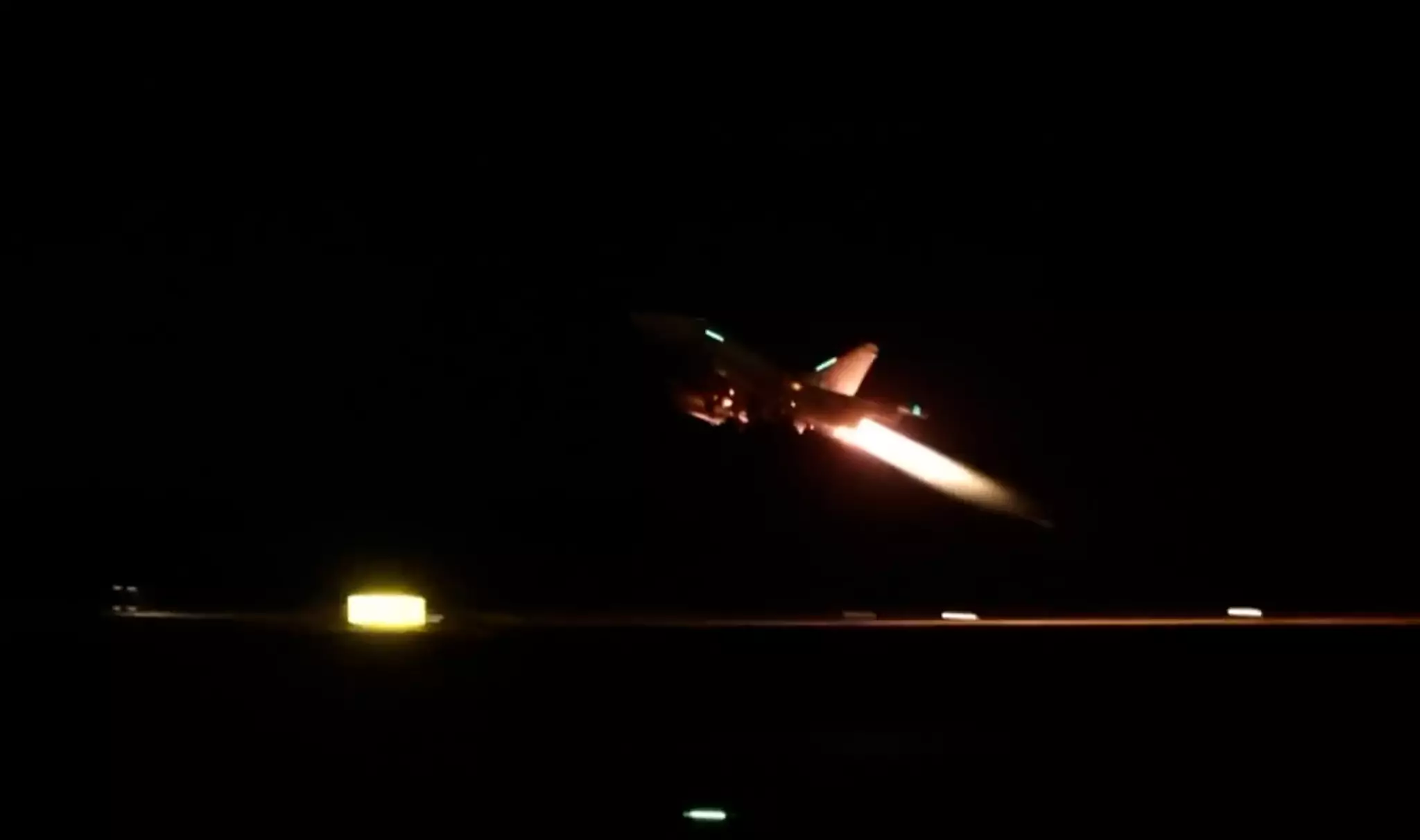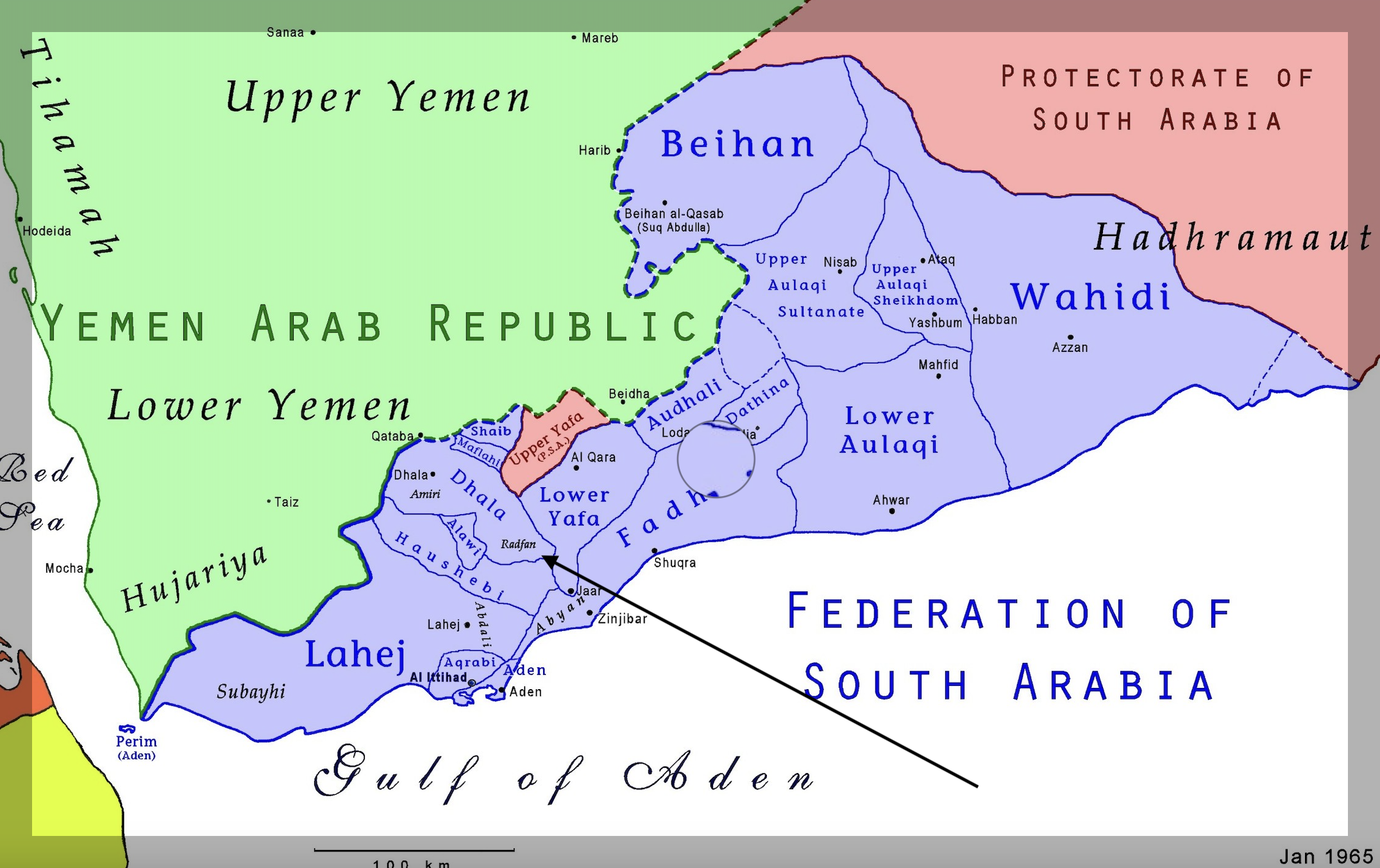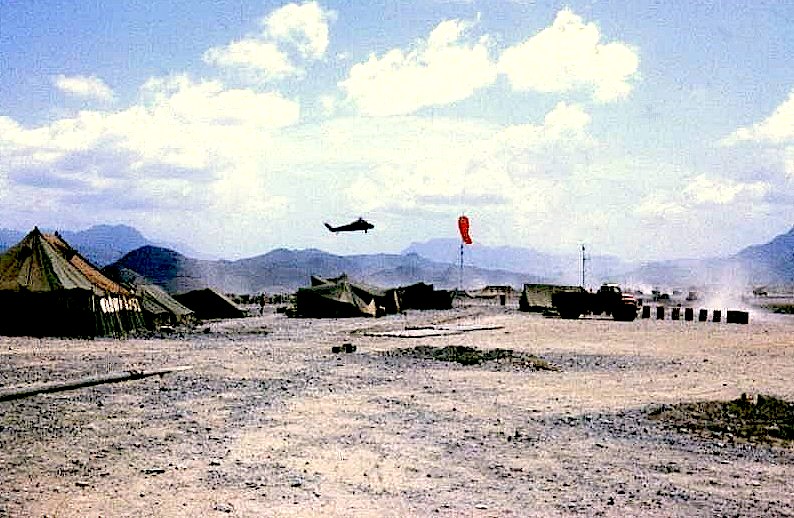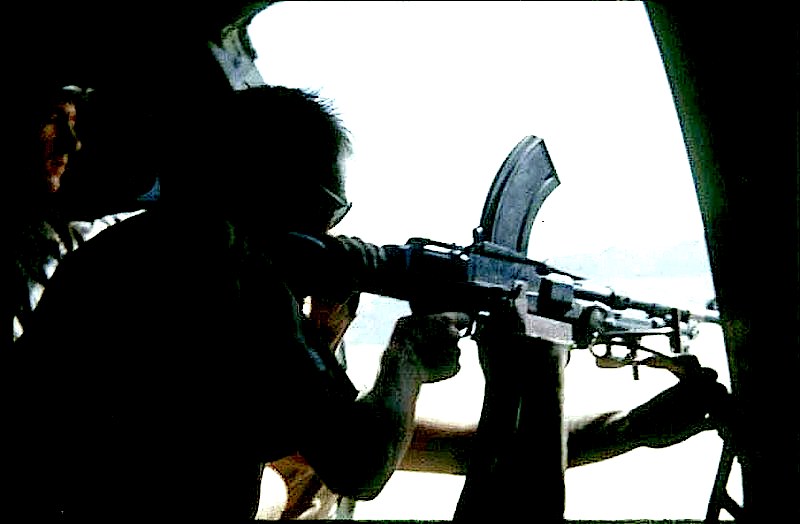The U.K. military’s latest bombing of Yemen comes on the 60th anniversary of a forgotten British campaign in the country, Mark Curtis reports.

An RAF Typhoon takes off from Akrotiri on Cyprus to bomb Yemen. (MOD via DeclassifiedUK)
By Mark Curtis
Declassified UK
 U.K. air strikes on the Houthis in Yemen – who have dared to challenge Western support for Israel over Gaza – are taking place exactly 60 years after a brutal British bombing campaign in the country.
U.K. air strikes on the Houthis in Yemen – who have dared to challenge Western support for Israel over Gaza – are taking place exactly 60 years after a brutal British bombing campaign in the country.
The so-called Radfan revolt of early 1964 in modern-day Yemen has long passed out of historical memory.
We should remember it though, as evidence of how British foreign policy is practised in reality – and how we only truly find out about that reality once government files are released decades later.
Independence on Our Terms
The Radfan is a mountainous area about 50 miles north of Aden, Yemen’s major southern port. In the early 1960s, it was part of a British colonial creation – the Federation of South Arabia, a grouping of sheikhdoms and sultanates established by London.
The U.K. was prepared to grant independence to South Arabia, but only on certain terms. Sir Kennedy Trevaskis, the high commissioner in Aden, noted that independence should “ensure that full power passed decisively into friendly hands.”
This would leave the territory “dependent on ourselves and subject to our influence.”
Much of the population refused to cooperate with British plans, and not only politicised groups in Aden. In January 1964 tribesmen in Radfan launched raids on federation targets and British convoys in the area.

Map of Federation of South Arabia with arrow pointing to Radfan. (Wikimedia Commons, Public domain)
They were concerned about receiving declining revenues as a result of British plans for a customs union across the federation and were inspired by the anti-colonialism of Egypt under Gamal Abdel Nasser, the Arab nationalist leader in the Middle East.
‘Whatever Methods Necessary’
The response of the British authorities under the Conservative government of Alec Douglas-Home was ferocious. Colonial secretary Duncan Sandys called in April 1964 for the “vigorous suppression” of the revolt and that the U.K. military be authorised “to use whatever methods are necessary.”
The only thing that concerned Sandys was to “minimise adverse international criticism” — indicating that propaganda operations, then as now, were of utmost importance.
A political directive issued to British forces in April 1964 stated that U.K. troops “must take punitive measures that hurt the rebels, thus leaving behind the memories that will not quickly fade.”
The idea was “to make life so unpleasant for the tribes that their morale is broken and they submit.”

RAF Westland Wessex helicopter in Aden during the Radfan Campaign in 1964. (Peter Bannister photo via Flickr account of Dick Gilbert, CC BY 2.0)
Captain Brian Drohan, a scholar at the U.S. military academy at West Point who has also analysed the British declassified files, wrote that “the Radfan population felt the full force of colonial coercion as British forces bombed villages, slaughtered livestock, and destroyed crops”.
‘Casualties to Women & Children’
One tactic was “ground proscription,” in which certain areas in Radfan were designated as off limits.
“All inhabitants, regardless of their status as civilians or combatants, were required to leave, turning virtually the entire population of a proscribed area into refugees,” Drohan notes.
Please DONATE to CN’S Winter Fund Drive
British soldiers were ordered to confiscate property, burn fodder and destroy grain stores and livestock. Rules of engagement allowed commanders to use aerial and artillery bombardment “to the maximum extent necessary” when villages refused to surrender.
In such circumstances, “casualties to women and children must be accepted,” the U.K. directive stated.
As part of a British army deployment, which involved the Parachute regiment and marines, a small SAS team was also sent in April, assisted by ground attack Hunter warplanes. The SAS killed some 25 rebels but lost its commander and radio operator, whose bodies had to be left behind.
These were decapitated and the heads displayed in Yemen, an incident that caused anger and shock throughout Britain.
Air Strikes

Sortie in an RAF Bristol Belvedere the Radfan Campaign in 1964. (Peter Bannister photo via Flickr account of Dick Gilbert, CC BY 2.0)
Air strikes were approved in May and Trevaskis suggested sending soldiers to “put the fear of death into the villages” controlled by the rebels.
If this wasn’t enough to secure submission, then Trevaskis said “it would be necessary to deliver some gun attacks on livestock or men outside the villages.”
He added:
“Since tribesmen have been regularly firing at our aircraft and have hit several of them, we might be able to claim that our aircraft were shooting back of [sic] men who had fired at us from the ground.”
For the RAF, air proscription meant that “villages may be attacked with cannon and grenades” and allowed pilots to target cattle, goats, crops, and people in proscribed areas, the files state.
British forces had been authorised by ministers to “harass the means of livelihood” of villages in order to bring the rebels to submission.
Livestock and crops were sources of wealth and sustenance for the Radfani tribes. “Attacks against these targets amounted to economic warfare waged against entire communities with little attempt to distinguish between civilian and combatant,” Drohan notes.
In one attack, a single Shackleton bomber expended 600 20mm cannon rounds and dropped 60 aerial grenades. The pilot reported firing his cannon at a herd of goats while dropping six aerial grenades on another goat herd, 11 on cattle, eight on “people” — without specifying civilian or combatant — and an additional 14 on “people under trees.”
In more than 600 sorties over Radfan, the RAF fired 2,500 rockets and 200,000 cannon rounds.
There were no restrictions on using 20lb “anti personnel bombs” – similar to what are now called cluster bombs – although “the public relations aspect” of these “will want very careful handling”, the Ministry of Defence noted.
Thus defence secretary Peter Thorneycroft asked the chief of the Air Staff to “ensure the secrecy of the operation” to use these bombs.
Poverty

Street riots in Aden in 1967, in aftermath period of the U.K. 1964 Radfan campaign. (Al-Omari, Wikimedia Commons, Public domain)
As the files in so many other of Britain’s wars in the Middle East show, U.K. planners were perfectly aware of the plight of the people they were attacking.
The Middle East commander in chief, Lt Gen Sir Charles Harington, recognised that the Radfan tribesmen “have been eking out a poor and primitive existence for hundreds of years.” Their situation was that “there is barely sufficient substance to support the population, families seldom making more than £50 a year profit.”
“Therefore,” he noted, “the temptation and indeed the necessity to look elsewhere for aid is understandable” – which is what many people did, turning to offers from Nasser’s Egypt and the new republican government in North Yemen, against whom the U.K. was also fighting a covert war.
Harington also noted that if Britain “had given more financial help” to the Radfanis in the past “the temptation to go elsewhere for the price of subversion might have been avoided.”
Bribes
Paying bribes to local tribal leaders was another way to secure control over the population. Sandys called for the high commissioner to pay “personal subsidies” to key members of the council of the Federation of South Arabia.
In January 1964, Trevaskis was given £50,000 to pay such bribes. He was also provided with £15,000 “to help undermine the position of the People’s Socialist Party in Aden,” the most important political opposition to continued British rule in the territory.
The high commissioner noted that this money would help “to prevent their winning coming elections.” In July 1964 ministers also approved £500,000 for Trevaskis “to distribute to rulers where this would help to prevent tribal revolts.”
With the advantages of airpower and artillery, the British military captured its territorial objectives by late July as Radfan tribes retreated over the border into North Yemen. Having removed them from their homes, U.K. forces occupied the Radfan and continued enforcing proscription through air and ground patrolling.
Official figures are that Britain lost 13 soldiers during the conflict. It is not known how many Radfanis were killed.
The Federation of South Arabia went on to become part of independent South Yemen in 1967, after a protracted liberation war against British forces.
Mark Curtis is the editor of Declassified UK, and the author of five books and many articles on UK foreign policy.
This article is from Declassified UK.
Please DONATE to CN’S Winter Fund Drive



Having “Lord Cameron” as FM helps the UK continue its colonial legacy of destruction.
Makes you proud to be British, doesn’t it.
This is only one of hundreds of similar genocidal episodes perpetrated in every corner of the globe in several hundred years of the glorious British Empire, long forgotten and consigned to the dustbin of history.
The genocide in colonial Ireland of the mid 17th century. The massacre of over a hundred million native North and South Americans. The Australian aborigines. The Potato Famine. The Bengal Famine. The Kenya Mau Mau. To name but a few. The list is long and undistinguished, down to the British contribution to more recent bloodbaths in Iraq, Libya, Afghanistan, Syria, Palestine, Ukraine and elsewhere.
This country is not, and never has been a force for good in the world.
Yet, somehow they go around claiming that they champion human rights and no one in the west blinks an eye.
And just look at the people in government now. Here’s an article on the Bengal famine:
Xxxx://www.theguardian.com/world/2019/mar/29/winston-churchill-policies-contributed-to-1943-bengal-famine-study
The Great Churchill refused to authorise any relief aid to Bengal because there was no need – “they just breed like rabbits anyway.”
Just like 30,000 dead in Gaza and kids having their limbs amputated without anaesthetics is no big deal.
But when Jews in Eilat have their cheap Chinese plastic knick knacks cut off, then oy vey! holy shit! we gotta bomb those suckers!
You have to get your priorities right, after all.
What typical Western, and especially Anglo-American, condescension in response to a fairly restrained Houthi attempt to convey the urgency in getting America’s global war machine to ratchet down Team Israel’s delivery of mass slaughter upon the last of the Palestinians in Gaza, i.e., a slight perturbation in the scheduling of over-sea global supply chains by the Semitic “primitives” to underscore the seemingly more serious outrage by transplanted European Jewry of murdering women, children, the old and the infirm by the tens of thousands to clear an offensive Palestinian presence from what remains of all Palestine which Israel unilaterally has come to claim entirely as its own.
A case, really, of nothing more than a few peace-loving Jewish real estate moguls cancelling what they insist was just a long-term lease on the property after a mere two thousand year occupation. They say the necessary cleansing of a putrid ethnic defilement was, in fact, specified in the original contract brokered by Yahweh himself. Never mind that the paper work has been long lost, the realtor is no longer licensed in the property’s legal jurisdiction and the principle of adverse possession would normally apply. In short, in spite of all precedents the “civilised” West wants what it wants and will have it by whatever means because “Jewish,” “Western,” “Democratic,” “European,” “Anglo-Saxon” and “American” privilege trumps anybody else’s privilege by an absolute and boundless amount of any medium of exchange you might prefer from beans to bullshit. So, sorry, Houthi’s, it is your fate to be subject to mass slaughter by American weapons of mass destruction just because you tried to mitigate the mass extermination of Palestinian innocents. You would think that everyone on this planet would have the rules-based order of everything down pat by now. Think of it all as one more lesson learned from your pale-faced betters.
Great comments/piece Realist. Says it all comprehensively.
Just read this article and you will understand what’s happening today in Western Asia, Congo, Sudan, the horn of Africa, and of course Ukraine.
But there’s a difference. In those days they had to pretend they weren’t dropping cluster bombs. Now the US openly gives them to its proxies in Kiev (not to be used against civilians, of course!)
What a legacy the British Empire has left.Border disputes between China and India because of British confiscating Chinese for Indian benefit. Left Guyana a basket case , created the State of Israel, divided the middle East into nations with straight border lines but nothing that made sense. The US is maintaining this legacy..Glen Hedley
Excellent coverage of the historical context in Yemen. Thank you for publishing this fine article from Mr. Curtis.
Some believe that the UK is just a vassal of the US empire, however we see that long-term UK foreign policy is being carried out. Much of US foreign policy can be seen as a continuation of long-term British foreign policy. (See Halford Mackinder, Zbig B. and others)
The UK is not a vassal like Germany, Japan or others, it is the Jr. Partner in the Anglo-American empire. In many ways, the US became the Sr. partner after the Bretton Woods conference in 1944, and the passage of the Bretton Woods Agreements Act in 1945.
indeed. and so Empire always strikes first, be it from UK, US, NATO HQ.
I agree that the US ruling class has simply taken over from the British ruling class as manager of the empire, but I think we need to widen our view and deepen our history still further. We have to remember as well the Portuguese in East Africa, the Dutch in Indonesia, the French in West Africa and the Caribbean , the Belgians in the Congo, the Spanish in Latin America, the Germans in Namibia (the dress rehearsal for the Nazi holocaust), the Japanese in S.E. Asia, and so many others.
A more complete title for this five centuries old empire would be “Euro-American”, or still more correctly, “World capitalist empire centered in the Global North”.
We are witness to nothing less than the cruel and striking continuity of the UK ruling class whose imperious brutality is again on display in their bombastic alacrity to launch air strikes against the Houthis in Yemen. An act of war against a country who declared its solidarity with the Palestinians in Gaza and actively intervened to stop their genocide by the Israelis. But this characteristic act in support of the Israeli genocide by the UK elite would come as no surprise to any student of Britain’s Imperial history and its hidden legacy of atrocities.
The bombing campaign and scorched earth policy (banned under the Geneva Conventions in 1977) conducted against the Radfani tribes people in Yemen by the Tory Government in 1964 was indisputably a continuation of a military strategy originated and applied against the civilian population by Lord Kitchener in the Anglo-Boer War of 1899 – 1902.
We see in greater measure of horror unfolding in Gaza a scorched earth policy culminating in Genocide and displacement of the Palestinian population by Israel both supported and materially assisted by the UK ruling class who leaving aside their fake protestations and obfuscations are as venal and arrogant as their predecessors in 1899 and 1964. If any person doubt this consider their record of loud mouthed and blood soaked support for Ukraine and their vehement desire to see the war against Russia whom they unreservedly hate, fought to the last Ukrainian man, woman or teenage soldier.